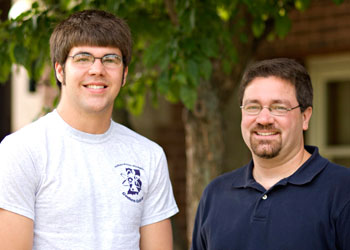Friday, September 4, 2009
Students research the history of Mennonite youth ministry

Goshen College students Josh Hertzler (left) and Anna Showalter (unavailable for photo) teamed up with Campus Pastor Bob Yoder (right) through the college's Maple Scholars program to go through archives and to take a deeper look into the history of Mennonite youth ministry this summer.
Maple Scholars is Goshen College's eight-week summer program, which took place June 8 to July 31, and provides students an opportunity to work one-on-one with a faculty member on a focused project.
This year's research project was part of a larger project Yoder is working on that is extending over three years, and Showalter and Hertzler's projects have the potential of being a part of a book he is working on about youth ministry. It will include seven to eight essays written by various people. According to Yoder, there really are not very many books available that talk about Mennonite youth ministry.
Last summer marked the start of Yoder's research project as two students, Matthew Harms and Jonny Meyer, studied the history and practice of 20th century Mennonite youth ministry. "Specifically, Harms studied one-week service mission's trips and their affect on youth, while Meyer studied Mennonite Youth Fellowship (MYF) between the years of 1948-1968 when MYF was more formal and had its own convention with delegates," Yoder said.
As history majors, Hertzler and Showalter have enjoyed the opportunity to dig into the archives and do research this summer. While Showalter found the beginning processes of picking a topic and starting the research a challenge, Hertzler knew early on what he wanted to study. "The best part has been spending time learning something that is an important part of the Mennonite church," said Hertzler, a junior from Marietta, Pa.
Showalter, a senior from Waynesboro, Pa., looked at the Young People's Conference (YPC) involving Goshen College students that lasted from 1920 to 1923. "In a post World War I era, young visionaries were returning home to the old Mennonite church having experienced intense situations leading them to change their views of the world," Showalter said. "They had developed ideas of what the church should be and became critics of the current church setting."
YPC had a vision of giving young people a voice in the church and for the church to become more aware of the needs of the world. Showalter said, "Politics of the old Mennonite church of the time got in the way and the controversy brought an end to YPC."
While the YPC ended, "the vision had a lasting impact on the church and the church started the Young People Problems Committee and other youth institutes," explained Showalter.
Hertzler decided to take a deeper look at Mennonite camping and why the camping experience is vital to Mennonite youth and the church. "I attended camp as a kid, worked there as a counselor and music leader," said Hertzler. "Camp has always been one of my greatest passions in the church and it is a big part of Mennonite youth ministry."
Through his project, Hertzler argued for the need of a positive, reciprocal relationship between Mennonite Camping Association (MCA) and Mennonite Church USA. "MCA was started in 1960 with the intention of being a common ground throughout the Mennonite camps, keeping communication open between the camps," Hertzler said, "What seems to be missing is more than an official relationship with Mennonite Church USA, a relationship that provides more support."
In the course of his research, Hertzler learned that in the summer of 1968, 11,000 youth attended a Mennonite camp. Why was there such a draw for Mennonite camping? Hertzler believed it is because the positive effect camp has on all of those involved. "The camping experience is valuable for Mennonite youth as it promotes faith development, the nurturing evangelism, adult leadership skills, environmental education and other values," Hertzler said.
According to Yoder, there is a likelihood the essays will show up in his book about youth ministry that he hopes will serve as an encouragement for the wider church.
-By Julie Weirich
Editors: For more information about this release, to arrange an interview or request a photo, contact Goshen College News Bureau Director Jodi H. Beyeler at (574) 535-7572 or jodihb@goshen.edu.
###
Goshen College, established in 1894, is a residential Christian liberal arts college rooted in the Anabaptist-Mennonite tradition. The college's Christ-centered core values – passionate learning, global citizenship, compassionate peacemaking and servant-leadership – prepare students as leaders for the church and world. Recognized for its unique Study-Service Term program, Goshen has earned citations of excellence in Barron's Best Buys in Education, "Colleges of Distinction," "Making a Difference College Guide" and U.S. News & World Report's "America's Best Colleges" edition, which named Goshen a "least debt college." Visit www.goshen.edu.

 E-mail this story
E-mail this story